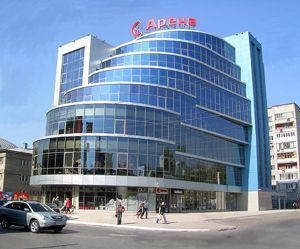
Mall-2009: from conversations to actions

As experts predicted, the situation on the retail real estate market began to change. Just a year ago, it seemed absurd to talk about the time when power on it would pass from the landlord to the tenant. In winter, however, tenants turned from talking to action. The proof of this was the 6th international exhibition "Mall", which took place in early April in Moscow.
 The anti-crisis business forum, included in the Moll program, gathered the whole world of Russian development, which very emotionally discussed the current situation. Meanwhile, most of the major Russian retailers this time ignored the meeting. They did not even pay attention to the special conference “Retail-2009: where are we going?”. Although a year ago, none of them would have refused an extra meeting with landlords. But their current actions suggest that the roles have changed and the retail real estate market has been turned upside down, as developers say.
The anti-crisis business forum, included in the Moll program, gathered the whole world of Russian development, which very emotionally discussed the current situation. Meanwhile, most of the major Russian retailers this time ignored the meeting. They did not even pay attention to the special conference “Retail-2009: where are we going?”. Although a year ago, none of them would have refused an extra meeting with landlords. But their current actions suggest that the roles have changed and the retail real estate market has been turned upside down, as developers say.
What happens to rental rates?
For the last two years, retail has been going to all kinds of exhibitions and conferences, time after time raised a painful question for itself about unrealistic rental rates, was indignant, complained, angry, snapped. Still, the conversation with the developers was short: if you don't want to pay, goodbye. The struggle for a place in a competent shopping center was so great that retail "squeaked, but paid."
The indignation of retailers reached its limit in the first months of the crisis, when sales fell and rental prices remained the same. A wave of so-called “cartel letters” began, in which retailers in whole groups demanded a reduction in the rental rate or a transition to paying rent depending on turnover.
Initially, developers were outraged, but on the sidelines they were already talking with individual tenants, agreeing on an adjustment to the rental rate. “The negotiation process has become an everyday reality for us,” said Andrei Sukhov, First Deputy Director of Manezhnaya Square Management Company OJSC. - Leaving us, retailers immediately sign up in line for the next meeting. And this war of nerves has been going on since November. It seems that the retailers organizedly agreed to bend the landlord in order to minimize the rental rate. In this regard, today we have already exceeded the annual plan for the replacement of tenants by 4%. ” Meanwhile, Okhotny Ryad, apparently, does not intend to reduce rental prices. And other developers fully support these actions, arguing that by lowering the rate to one tenant, you potentially reduce it to everyone else.
Nevertheless, most shopping and entertainment centers (especially district and regional ones) make concessions. This was stated by the director of the department of retail space in Russia and the CIS, Jones Lang LaSalle, Alexander Tishkov: “Of course, today we need to meet the tenant: reduce the rental rate, fix it in rubles, assign a percentage of turnover. After all, the business engine is a successful tenant, of whom there are few now and therefore they need to be valued. ” Mr. Tishkov noted that in three new projects, his company did not lose a single tenant. Meanwhile, they agreed to give them a discount only in March, when special sales failures were observed. At the same time, for good facilities the discount did not exceed 15%, for medium ones - 20%. In both cases, tenants entered into temporary agreements that will be reviewed in three months.
An ambiguous attitude among developers is causing the transition to linking the rental price to the percentage of turnover. It is worth clarifying here that we are talking about a fixed rate plus a percentage of turnover, and not about a bare percentage as such. So, Andrei Sukhov believes that this is the biggest mistake of the developer, because, getting the desired percentage, the tenant falls asleep, does not seek to increase turnover, but pays as much as it turns out in the end. In turn, the executive director of Colliers International Maxim Gasiev insists that in two years the payment of rent with a percentage of the turnover will become a standard practice. “A year ago, working on a percentage basis was rare, but today such iconic retailers as Zara, H&M, Gap do not go to a regional shopping center on other terms. And they come at a percentage of the turnover without a fixed part, ”adds Mr. Gasiev.
Developers do not want to switch to a percentage of turnover for another reason. If there is no question of transparency of cooperation with large networks, it is common for individual entrepreneurs or local networks to dissemble, hiding their true incomes. Tatyana Medvedeva, general director of the Volgograd group of Diamant companies, said that in her practice there were cases when, working on a percentage of turnover, tenants hid the third cash desk. Unfortunately, developers have not yet come up with an exact recipe on how to deal with this phenomenon, although there are options. So, the general director of Watcom LLC Roman Skorokhodov shared his story, as he once proposed to tenants to establish a single cash system - a “common cash desk”, which would help make reporting more transparent. However, citing technical requirements, tenants decided that this system was not suitable for them.
There is one more question that management companies are very interested in: how can they plan the annual budget if tenants work at a percentage of turnover? By the way, he remained unanswered. The conclusion reached by the developers turned out to be tough in the spirit of the times: if the tenant cannot pay the rental rate, then there is no need to save him by giving a discount. He dies and becomes not interesting to the buyer, and thereby undermines the image of the shopping center. Therefore, it is best to say goodbye to him, exchange for a stronger one, because the law of natural selection has not been canceled.
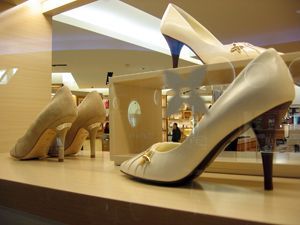 How to operate a shopping center in a crisis?
How to operate a shopping center in a crisis?
In a difficult situation, not only developers. For sellers, the forecasts for the 2009 year are also unfavorable forecasts. Tatyana Matyushina, Deputy General Director of Market Masters Consulting Agency, spoke about the decline in the B2C market capacity to the level of 2002 of the year. In her opinion, the demand in the clothing and footwear sector (especially for single-brand boutiques) may decrease by 30-40%. “There is a kind of leaching of the middle class, from 23% in 2008 to 16-18% by the beginning of 2010,” continues Tatyana Matyushina. - The average time spent by a customer in a shopping center has already been reduced by 30%, and the frequency of family shopping is also decreasing. In the near future, economical trading formats will be of particular interest to consumers ”(for other forecasts of consumer behavior, see the article“ Summer will be tough! ”, FASHION report, #7).
Statistics suggest the following scenarios: the migration of visitors from “expensive formats” to cheaper ones and the transition from lower-quality shopping centers to better ones. What to do, how to act to stay in the market? Tatyana Matyushina advises not to reduce, but rather, increase the marketing budget, focusing on BTL campaigns and event marketing. By the way, this is supported by the lion's share of the conference participants. It is believed that discounts are now more effective than bonuses (an alternative opinion that you should not get carried away only with price offers is in the article “How to sell to those who do not want to buy” in the same issue), which means you should consider whether the shopping center has a single discount system , and if not, it makes sense to think about its introduction. In addition, Tatyana Matyushina recommends diagnosing the demand for the object. The General Director of South Pole LLC Leonid Pomerantsev believes that in today's conditions it is important to preserve qualified personnel: “You trained these personnel yourself, invested in their training. Parting with them now is a big mistake. ”
In turn, Alexander Tishkov cited a whole list of transformations in shopping centers where you can save money, and outlined those that should not be sacrificed. It allows reducing the number of security posts inside the building (excluding parking), if it is possible to strengthen the video surveillance system, saving on the services of a cleaning company and buying cheaper cleaning products. Temporarily, you can reduce the cost of paying for mobile communications for office employees, transportation costs, and abandon the bonus program for encouraging staff. For some period you can forget about the placement of signs and outdoor advertising in the city.
But Alexander Tishkov still does not recommend saving on service and the safety of visitors. Otherwise, the object can go into the category of substandard and lose part of the buyers.
New shopping center, does he have a chance?
Despite everything, there are still not enough quality shopping centers in Russia. Therefore, according to experts, it is possible to build as long as the retail is ready to lease premises. In turn, the director of the European Institute of Trade, Bernd Hallir, believes that it is possible and necessary to build new shopping centers today, because the crisis will pass, and they will again become in demand. You just need to seriously think over the concept. As an example of such a plan, Tatyana Aster, vice president for marketing and PR policy of DVI holding, cited the new ComsoMall shopping center in Yekaterinburg, which her company plans to open in 2009. “We changed the concept of the shopping mall quite recently. Initially, it was planned to do a project in the style of Rock & Mall. But it is clear that today he would not be in demand, - Tatiana believes. “Therefore, having relied on discounters and stores operating on the principle of“ everything at the old price ”, we decided to change the concept of the complex and reposition it." This is how ComsoMall appeared, which with its accessibility, slogans and posters is nostalgic for the Soviet times, to some extent consonant with the present. “I believe that those who are just opening their projects this or next year are very lucky,” continues Tatiana Aster. “After all, it is much more expensive now to rebrand a shopping center than to include all possible risks in a new project.”
Yet at the moment, the most successful new project is the Moscow Metropolis, which opened with aplomb at the end of the winter of 2009. Apparently, the developers themselves are wondering if anyone else can repeat this success. Be that as it may, the situation on the market remains complicated and more closely resembles Krylov’s fable “Swan, Cancer and Pike,” when the developer and retailer pull projects in different directions, thereby preventing them from moving and developing. Although today more and more often they speak not about development, but about survival.
| Please rate the article |
Materials on the topic
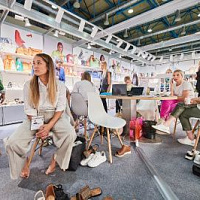
Euro Shoes starts in a month in Moscow!

Euro Shoes will start operating on February 19 in Moscow!
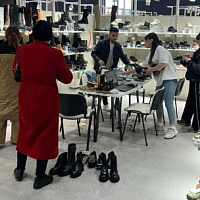
The Euro Shoes @ CAF exhibition was successfully held in Almaty

The Euro Shoes@CAF exhibition will be held in Almaty

The Euro Shoes exhibition expanded its geography of influence and added components to the new pavilion
Popular
 Coach turned to Big Data analysis and won the interest of a young audience
American handbag brand Coach has planned the success of its Tabby model among a younger audience, Generation Z, by turning to big data analysis, abandoning traditional and analogue tools, such as human intuition or the ability of any executive to sense “which way the wind will blow,” writes B.O.F.
Coach turned to Big Data analysis and won the interest of a young audience
American handbag brand Coach has planned the success of its Tabby model among a younger audience, Generation Z, by turning to big data analysis, abandoning traditional and analogue tools, such as human intuition or the ability of any executive to sense “which way the wind will blow,” writes B.O.F.
 IDOL updates the concept
The IDOL brand, part of the Melon Fashion Group portfolio, opened the first flagship in an updated concept in the Aviapark shopping center in Moscow.
IDOL updates the concept
The IDOL brand, part of the Melon Fashion Group portfolio, opened the first flagship in an updated concept in the Aviapark shopping center in Moscow.
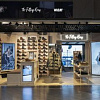 Current techniques in lighting a shoe store
Today, walking through the galleries of shopping centers, we see a variety of formats of offline stores. New concepts of retail spaces attract with an individual, memorable design. In a certain sense, they are an element of the show, a tool through which the buyer receives a new and interesting experience. Together with SR expert in the field of lighting technology in retail, Tatyana Ryzhova, we will look at current lighting design techniques for modern shoe stores, which we will see more and more often in new retail outlets in the near future.
Current techniques in lighting a shoe store
Today, walking through the galleries of shopping centers, we see a variety of formats of offline stores. New concepts of retail spaces attract with an individual, memorable design. In a certain sense, they are an element of the show, a tool through which the buyer receives a new and interesting experience. Together with SR expert in the field of lighting technology in retail, Tatyana Ryzhova, we will look at current lighting design techniques for modern shoe stores, which we will see more and more often in new retail outlets in the near future.
 Seven “sins” of the shoe business. How do owners harm the company with their own hands?
Why is Company X able to create a strong, profitable brand, but Company Y is struggling to make ends meet? Many people prefer to attribute success to luck, luck, or the support of strong patrons. And few people ask themselves the question: “What am I doing wrong?” Moreover, many entrepreneurs begin to harm their business from the first day of its opening. In this article, together with SR expert in the field of fashion business management and development, Maria Gerasimenko, we will look at the 7 main “sins” that business owners commit using specific examples.
Seven “sins” of the shoe business. How do owners harm the company with their own hands?
Why is Company X able to create a strong, profitable brand, but Company Y is struggling to make ends meet? Many people prefer to attribute success to luck, luck, or the support of strong patrons. And few people ask themselves the question: “What am I doing wrong?” Moreover, many entrepreneurs begin to harm their business from the first day of its opening. In this article, together with SR expert in the field of fashion business management and development, Maria Gerasimenko, we will look at the 7 main “sins” that business owners commit using specific examples.
 Louis Vuitton opens a new factory in Italy
Louis Vuitton has opened its second shoe factory in Italy. After opening the first one in Fiesso d'Artico in Veneto, the LVMH flagship brand has just opened a new production site dedicated to this category of footwear in the industrial zone of Civitano in the Marche region. There is also another brand production facility in Tuscany, where bags and leather accessories are produced, writes fr.fashionnetwork.com.
Louis Vuitton opens a new factory in Italy
Louis Vuitton has opened its second shoe factory in Italy. After opening the first one in Fiesso d'Artico in Veneto, the LVMH flagship brand has just opened a new production site dedicated to this category of footwear in the industrial zone of Civitano in the Marche region. There is also another brand production facility in Tuscany, where bags and leather accessories are produced, writes fr.fashionnetwork.com.
 The Euro Shoes@CAF exhibition will be held in Almaty
From March 11 to 13, the Euro Shoes@CAF (Central Asia Fashion) exhibition will be held in Almaty at the Atakent exhibition complex. The exhibition, which is the largest international event in the fashion industry in Central Asia, will present collections of clothing, shoes and accessories.
The Euro Shoes@CAF exhibition will be held in Almaty
From March 11 to 13, the Euro Shoes@CAF (Central Asia Fashion) exhibition will be held in Almaty at the Atakent exhibition complex. The exhibition, which is the largest international event in the fashion industry in Central Asia, will present collections of clothing, shoes and accessories.
 Euro Shoes will start operating on February 19 in Moscow!
The winter session of the international exhibition of footwear and accessories Euro Shoes premiere collection will be held in Moscow at the Expocenter from February 19 to 22. The organizers promise the presence of all the main participants at the exhibition, as well as new names from Europe, Asia and Russia.
Euro Shoes will start operating on February 19 in Moscow!
The winter session of the international exhibition of footwear and accessories Euro Shoes premiere collection will be held in Moscow at the Expocenter from February 19 to 22. The organizers promise the presence of all the main participants at the exhibition, as well as new names from Europe, Asia and Russia.
 American buyers couldn't buy Birkin bags and sued Hermès
French fashion house Hermès is facing a lawsuit in California from two customers who were unable to purchase exclusive Birkin bags. The fashion house is accused of unfair commercial practices.
American buyers couldn't buy Birkin bags and sued Hermès
French fashion house Hermès is facing a lawsuit in California from two customers who were unable to purchase exclusive Birkin bags. The fashion house is accused of unfair commercial practices.
 Why Rendez-Vous and Yandex Lavka released a “bread bag”
Shoe retailer Rendez-Vous announced the launch of a spring collaboration with Yandex Lavka and released a roll that resembles the shape of a woman’s handbag. This “Bread Bag” is presented in the Yandex.Lavka application at a price of 249 rubles. On the product packaging there is a promotional code for 1000 rubles, which can be spent in the Rendez-Vous network.
Why Rendez-Vous and Yandex Lavka released a “bread bag”
Shoe retailer Rendez-Vous announced the launch of a spring collaboration with Yandex Lavka and released a roll that resembles the shape of a woman’s handbag. This “Bread Bag” is presented in the Yandex.Lavka application at a price of 249 rubles. On the product packaging there is a promotional code for 1000 rubles, which can be spent in the Rendez-Vous network.
 Camper has released innovative sneakers - designers
Spanish brand Camper's new Roku sneaker features six interchangeable components to create up to 64 different looks and color combinations. Roku means "six" in Japanese.
Camper has released innovative sneakers - designers
Spanish brand Camper's new Roku sneaker features six interchangeable components to create up to 64 different looks and color combinations. Roku means "six" in Japanese.
 Christian Louboutin presented a collection in a cowboy style
At the Loubi Show in Paris, the French luxury brand Christian Louboutin presented its fall 2024 collection, following the trend - in the style of the Wild West. It included cowboy boots and rhinestone loafers.
Christian Louboutin presented a collection in a cowboy style
At the Loubi Show in Paris, the French luxury brand Christian Louboutin presented its fall 2024 collection, following the trend - in the style of the Wild West. It included cowboy boots and rhinestone loafers.
 Turkish brand Vaneda on Euro Shoes
Street style, sport, outdoor, military – the main style directions of footwear of the company from Turkey
Turkish brand Vaneda on Euro Shoes
Street style, sport, outdoor, military – the main style directions of footwear of the company from Turkey
 Fashion Week takes place in Moscow
Fashion Week takes place in the Russian capital. Events include fashion shows, markets where you can purchase clothes, bags and accessories, and a B2B Showroom for fashion industry professionals.
Fashion Week takes place in Moscow
Fashion Week takes place in the Russian capital. Events include fashion shows, markets where you can purchase clothes, bags and accessories, and a B2B Showroom for fashion industry professionals.
 We are ready for active development in the Russian market
Friedrich Naumann, CEO of the Tamaris brand, told Shoes Report about the company’s ambitious plans, business development in Russia and expansion of the retail network, and also shared details about new collections and launches.
We are ready for active development in the Russian market
Friedrich Naumann, CEO of the Tamaris brand, told Shoes Report about the company’s ambitious plans, business development in Russia and expansion of the retail network, and also shared details about new collections and launches.
 Fashion trends Fall-Winter 2023/24 for commercial footwear purchases
Permanent contributor to Shoes Report. Elena Vinogradova, an expert in sales and purchases in the fashion business, prepared an overview of the trends for the autumn-winter 2023/24 season especially for us.
Fashion trends Fall-Winter 2023/24 for commercial footwear purchases
Permanent contributor to Shoes Report. Elena Vinogradova, an expert in sales and purchases in the fashion business, prepared an overview of the trends for the autumn-winter 2023/24 season especially for us.
 MSCHF and Crocs launch "Big Yellow Boots"
Creator of the Big Red Boots, Brooklyn brand MSCHF has teamed up with American plastic clog and sandal brand Crocs for another oversized shoe. The new Big Yellow Boots will go on sale on August 9th.
MSCHF and Crocs launch "Big Yellow Boots"
Creator of the Big Red Boots, Brooklyn brand MSCHF has teamed up with American plastic clog and sandal brand Crocs for another oversized shoe. The new Big Yellow Boots will go on sale on August 9th.
 Five rules of professional lighting for a shoe store - something that is relevant in any season
When developing a lighting concept for shoe retailers, it is important to take into account not only the history of the brand, the architectural content of the premises, the target audience of the stores, but also the seasonality of the goods. With the onset of the cold season, client preferences change: bright weightless shoes are replaced by more massive models in discreet dark colors. Despite significant differences in summer and winter collections, the overall philosophy of the brand, its recognition should remain unchanged at any time of the year. Tatyana Ryzhova, an SR lighting expert in fashion retail, has identified five basic rules for a competent lighting concept for a shoe store for readers of the magazine, which will help to present winter assortment to customers in a winning way.
Five rules of professional lighting for a shoe store - something that is relevant in any season
When developing a lighting concept for shoe retailers, it is important to take into account not only the history of the brand, the architectural content of the premises, the target audience of the stores, but also the seasonality of the goods. With the onset of the cold season, client preferences change: bright weightless shoes are replaced by more massive models in discreet dark colors. Despite significant differences in summer and winter collections, the overall philosophy of the brand, its recognition should remain unchanged at any time of the year. Tatyana Ryzhova, an SR lighting expert in fashion retail, has identified five basic rules for a competent lighting concept for a shoe store for readers of the magazine, which will help to present winter assortment to customers in a winning way.
 I doubt and object: how to find an approach to difficult clients?
How good and serene would be the work of a salesperson if the customers were calm, cheerful, always knew exactly what they wanted, and bought, bought, bought! It is a pity that this is possible only in dreams. Therefore, we will not dream, but we will act. Together with Maria Gerasimenko, a permanent author of SR, we understand the doubts and objections of buyers and build a strategy for working with them. Our expert pays special attention to the two main objections of buyers, on which 82% of sales are lost.
I doubt and object: how to find an approach to difficult clients?
How good and serene would be the work of a salesperson if the customers were calm, cheerful, always knew exactly what they wanted, and bought, bought, bought! It is a pity that this is possible only in dreams. Therefore, we will not dream, but we will act. Together with Maria Gerasimenko, a permanent author of SR, we understand the doubts and objections of buyers and build a strategy for working with them. Our expert pays special attention to the two main objections of buyers, on which 82% of sales are lost.
 EURO SHOES presents an updated section of the GLOBAL SHOES exhibition with collections of shoe and bag brands from Asian countries
EURO SHOES premiere collection is expanding. Along with the traditional pool of leading European footwear brands from Germany, Spain, Italy and Turkey, several dozen footwear and bag brands from the Middle Kingdom will be presented in the GLOBAL SHOES section at the Moscow Expocentre from August 29 to September 1.
EURO SHOES presents an updated section of the GLOBAL SHOES exhibition with collections of shoe and bag brands from Asian countries
EURO SHOES premiere collection is expanding. Along with the traditional pool of leading European footwear brands from Germany, Spain, Italy and Turkey, several dozen footwear and bag brands from the Middle Kingdom will be presented in the GLOBAL SHOES section at the Moscow Expocentre from August 29 to September 1.
 World Footwear Yearbook: Global footwear production reaches 23,9 billion pairs and is back to pre-pandemic levels
The Portuguese association of shoe manufacturers APICCAPS published the 13th edition of the international statistical bulletin World Footwear Yearbook for 2023, according to which in 2022 the production and export of shoes worldwide increased by 7,6% and 9%, respectively, and the world production of shoes reached 23,9 billion couples and returned to pre-pandemic levels.
World Footwear Yearbook: Global footwear production reaches 23,9 billion pairs and is back to pre-pandemic levels
The Portuguese association of shoe manufacturers APICCAPS published the 13th edition of the international statistical bulletin World Footwear Yearbook for 2023, according to which in 2022 the production and export of shoes worldwide increased by 7,6% and 9%, respectively, and the world production of shoes reached 23,9 billion couples and returned to pre-pandemic levels.
 Rostov footwear brand Novak presented a collection of sneakers and sneakers
In the spring-summer 2023 season, the Rostov-on-Don shoe brand Novak presented a cute collection of sneakers and sneakers for every day. The upper of the shoe is made of genuine leather, suede, nubuck, the sole is made of light EVA.
Rostov footwear brand Novak presented a collection of sneakers and sneakers
In the spring-summer 2023 season, the Rostov-on-Don shoe brand Novak presented a cute collection of sneakers and sneakers for every day. The upper of the shoe is made of genuine leather, suede, nubuck, the sole is made of light EVA.
 Jacquemus x Nike collaboration released
The second collaboration between Jacquemus and Nike, which has been talked about so much, is finally out. The appearance of the couple for many was a surprise. The model of Nike Air Force 1 sneakers, which was taken as the basis of the new collection, has undergone significant changes.
Jacquemus x Nike collaboration released
The second collaboration between Jacquemus and Nike, which has been talked about so much, is finally out. The appearance of the couple for many was a surprise. The model of Nike Air Force 1 sneakers, which was taken as the basis of the new collection, has undergone significant changes.
 Crocs releases a collaboration with Barbie
If Barbie ditched heels and wore crocs, they would be pink. It was this collection in pink that was released by the American brand of plastic clogs Crocs, for the release of the film "Barbie" in the United States.
Crocs releases a collaboration with Barbie
If Barbie ditched heels and wore crocs, they would be pink. It was this collection in pink that was released by the American brand of plastic clogs Crocs, for the release of the film "Barbie" in the United States.
 Japanese BAPE takes to the catwalk MSCHF Big Red Boots
The story of Brooklyn brand MSCHF's oversized rubber boots continues. The last time they made noise in the auditorium was at the Rick Owens menswear show. Now they have already appeared on the podium.
Japanese BAPE takes to the catwalk MSCHF Big Red Boots
The story of Brooklyn brand MSCHF's oversized rubber boots continues. The last time they made noise in the auditorium was at the Rick Owens menswear show. Now they have already appeared on the podium.
 Shoe educational program: what shoe soles are made of
“What is the difference between TEP and EVA? What does tunit promise me? Is PVC glue? What is the sole of these shoes made of? ”- the modern buyer wants to know everything. In order not to smash his face in front of him and be able to explain whether such a sole suits him in soles, carefully read this article. In it, process engineer Igor Okorokov tells what materials the soles of shoes are made of and what makes each of them so good.
Shoe educational program: what shoe soles are made of
“What is the difference between TEP and EVA? What does tunit promise me? Is PVC glue? What is the sole of these shoes made of? ”- the modern buyer wants to know everything. In order not to smash his face in front of him and be able to explain whether such a sole suits him in soles, carefully read this article. In it, process engineer Igor Okorokov tells what materials the soles of shoes are made of and what makes each of them so good.
 How to set prices that will earn
Some businessmen still confuse the concept of margin with the concept of trade margins and set prices for their goods, guided solely by the example of competitors. No wonder they go broke! Analyst at the Academy of Retail Technologies Maxim Gorshkov gives several tips and formulas with which you can set not only ruinous, but also profitable prices.
How to set prices that will earn
Some businessmen still confuse the concept of margin with the concept of trade margins and set prices for their goods, guided solely by the example of competitors. No wonder they go broke! Analyst at the Academy of Retail Technologies Maxim Gorshkov gives several tips and formulas with which you can set not only ruinous, but also profitable prices.
 Sales of shoes and accessories: effective techniques for business rhetoric
Which speech modules are effective in communicating with potential and current customers of shoe stores, and which are not, Anna Bocharova, a business consultant, knows.
Sales of shoes and accessories: effective techniques for business rhetoric
Which speech modules are effective in communicating with potential and current customers of shoe stores, and which are not, Anna Bocharova, a business consultant, knows.
 We form the salary of sellers: expert advice
“How do you charge your consultants for personal or general sales?” Is one of the most popular questions causing a lot of controversy and gossip on the online forums of retail business owners. Indeed, how to properly form the earnings of sellers? But what about bonuses, where to get a sales plan from, do employees allow them to buy goods at discounted stores? In search of truth, the Shoes Report turned to a dozen shoe retailers, but no company wanted to disclose its motivation system - the process of its development was too complicated and individual. Then we asked four business consultants, and finally became convinced that the topic of seller motivation is very complex, because even our experts could not come to a common opinion.
We form the salary of sellers: expert advice
“How do you charge your consultants for personal or general sales?” Is one of the most popular questions causing a lot of controversy and gossip on the online forums of retail business owners. Indeed, how to properly form the earnings of sellers? But what about bonuses, where to get a sales plan from, do employees allow them to buy goods at discounted stores? In search of truth, the Shoes Report turned to a dozen shoe retailers, but no company wanted to disclose its motivation system - the process of its development was too complicated and individual. Then we asked four business consultants, and finally became convinced that the topic of seller motivation is very complex, because even our experts could not come to a common opinion.
 Technology Selling Issues
There is nothing worse than meeting the buyer with the words “Hello, can I help you with something?”, Because the seller works in the store just to help. Criticizing this well-established pattern of communication with the buyer, Andrei Chirkarev, business coach for effective sales and the founder of the New Economy project, shares the technology of truly selling issues with readers of Shoes Report.
Technology Selling Issues
There is nothing worse than meeting the buyer with the words “Hello, can I help you with something?”, Because the seller works in the store just to help. Criticizing this well-established pattern of communication with the buyer, Andrei Chirkarev, business coach for effective sales and the founder of the New Economy project, shares the technology of truly selling issues with readers of Shoes Report.
 The whole truth about Bayer. Who is he and how to become one?
Bayer is no longer a new, but still a popular and sought-after profession. It’s fashionable to be a buyer. Buyers are at the origins of the emergence and development of trends. If the designer offers his vision of fashion in the season, then the buyer selects the most interesting commercial ideas. It is on buyers that the policy of sales of stores and what, in the end, the buyer will wear depends on. This profession is surrounded by a magical fleur, often associated with a lack of understanding of what exactly is the work of a buyer.
The whole truth about Bayer. Who is he and how to become one?
Bayer is no longer a new, but still a popular and sought-after profession. It’s fashionable to be a buyer. Buyers are at the origins of the emergence and development of trends. If the designer offers his vision of fashion in the season, then the buyer selects the most interesting commercial ideas. It is on buyers that the policy of sales of stores and what, in the end, the buyer will wear depends on. This profession is surrounded by a magical fleur, often associated with a lack of understanding of what exactly is the work of a buyer.
 Fur, and not only: types of lining
In the production of winter footwear, various materials are used that are designed to retain heat and meet the requirements of consumers: natural sheepleather, artificial fur, artificial fur from natural wool and others. All types of lining fur have their own advantages and disadvantages. Let's consider the properties of each of them.
Fur, and not only: types of lining
In the production of winter footwear, various materials are used that are designed to retain heat and meet the requirements of consumers: natural sheepleather, artificial fur, artificial fur from natural wool and others. All types of lining fur have their own advantages and disadvantages. Let's consider the properties of each of them.
 Retail Arithmetic
Before you begin to solve specific problems, you need to find out how accurately all the leaders of your company understand the basic terminology of retail.
Retail Arithmetic
Before you begin to solve specific problems, you need to find out how accurately all the leaders of your company understand the basic terminology of retail.
 How to fire a worker without tears, scandal and trial
Sooner or later, any manager is faced with the need to part with an employee. Properly and on time the dismissal procedure will save the company money, and the boss himself - nerves and time. But why sometimes, knowing that a break in relations is inevitable, we put off the decision for months?
How to fire a worker without tears, scandal and trial
Sooner or later, any manager is faced with the need to part with an employee. Properly and on time the dismissal procedure will save the company money, and the boss himself - nerves and time. But why sometimes, knowing that a break in relations is inevitable, we put off the decision for months?






